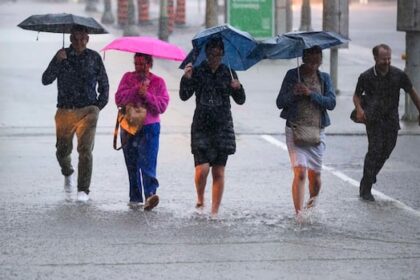Published Jul 26, 20256 minute readRCMP constables Adam Merchant, Aaron Patton and Stuart Beselt, the first officers on the scene in Portapique, are questioned by commission lawyer Roger Burrill at the Mass Casualty Commission inquiry in Halifax on March 28, 2022. Photo by Andrew Vaughan /The Canadian Press / poolArticle contentNova Scotia RCMP say they have addressed the system flaws and labour code violations identified in its response to the mass killing rampage in the province in April 2020.THIS CONTENT IS RESERVED FOR SUBSCRIBERS ONLY.Subscribe now to access this story and more:Unlimited access to the website and appExclusive access to premium content, newsletters and podcastsFull access to the e-Edition app, an electronic replica of the print edition that you can share, download and comment onEnjoy insights and behind-the-scenes analysis from our award-winning journalistsSupport local journalists and the next generation of journalistsSUBSCRIBE TO UNLOCK MORE ARTICLES.Subscribe or sign in to your account to continue your reading experience.Unlimited access to the website and appExclusive access to premium content, newsletters and podcastsFull access to the e-Edition app, an electronic replica of the print edition that you can share, download and comment onEnjoy insights and behind-the-scenes analysis from our award-winning journalistsSupport local journalists and the next generation of journalistsRegister to unlock more articles.Create an account or sign in to continue your reading experience.Access additional stories every monthShare your thoughts and join the conversation in our commenting communityGet email updates from your favourite authorsSign In or Create an AccountorArticle content“The RCMP have responded to all the issued directions and AVCs (assurance of voluntary compliance),” Cindy Bayers, strategic communications lead with RCMP Nova Scotia, said in an emailed response.Article contentArticle contentArticle contentThe directions and assurance of voluntary compliance with labour code contraventions stemmed from a workplace investigation by Lorna MacMillan, initiated in April 2020, into the incidents of April 18 and 19, 2020, that resulted in the death of Const. Heidi Stevenson and injuries to Const. Chad Morrison.Article contentGabriel Wortman, a 51-year-old Dartmouth denturist, killed 22 people in the rampage that began in the seaside Colchester County community of Portapique on the evening of April 19 and ended the next day with the gunman’s death at the Big Stop in Enfield.Article contentMacMillan, delegated by the head of Compliance and Enforcement for Economic Social Development Canada (ESDC) to conduct the investigation, identified a number of concerns about Nova Scotia RCMP’s response to the country’s largest mass shooting in six pages of orders under the federal Occupational Health and Safety Act on March 29, 2022.Article contentArticle contentThe concerns ranged from an RCMP failure to pass on 911 information to front-line officers to talking on open radio channels that Wortman could have picked up with a phone app or electronics store scanner.Article contentOfficers kept in the darkArticle contentMacMillan’s initial orders also revealed that the RCMP officers in the field in Portapique and beyond were poorly led because supervisors weren’t trained and the field officers were kept in the dark because they didn’t have night vision goggles.Article contentThe RCMP had been ordered to investigate why critical information received from 911 callers was not being broadcast over the radio by dispatchers. The communication breakdown meant that officers on the ground were hampered trying to track down the killer and also to identify one another.Article content“General duty members reverted to primitive means to self-identify, including flashing lights while driving,” MacMillan stated.Article content A memorial to the 22 people murdered in April 2020 in several small Nova Scotia communities was built at a former church building along the main road leading into Portapique, Colchester County. Photo by Contributed /ContributedArticle contentRadio communications being broadcast over unencrypted channels meant that on the morning of April 19, 2020, officers were put in danger. Anyone with a scanner, including possibly the gunman, “could hear, track and counter police actions during the unfolding critical event,” MacMillan’s orders said.Article contentThe RCMP was also ordered to investigate each identified system flaw and present the results of the investigations to MacMillan, no later than June 28, 2022.Article contentBayers said overall there were 13 directions issued to the RCMP by MacMillan that identified a total of 44 contraventions under the Canada Labour CodeArticle contentFurther to those directions, the ESDC issued five AVC (assurance of voluntary compliance) contraventions which had to be addressed by the RCMP. Article contentResponded to all directionsArticle contentBayers said the RCMP has responded to all issued directions and the “ESDC has advised the RCMP are either in compliance with or have presented an acceptable action plan to bring all contraventions into compliance.” Article contentArticle contentESDC issued its final Hazardous Occurrence Investigation Report on May 7, 2024, identifying an additional 38 non-binding recommendations which the RCMP has committed to addressing also, Bayers said.Article contentThe ESDC said in emailed response to a request for a copy of MacMillan’s final investigation report that an occupational health and safety component of the Canada Labour Code “limits the sharing of information gathered during an investigation, including the investigation report and related compliance and enforcement actions, to the workplace parties.”Article contentSpecific to MacMillan’s order regarding the transfer of command and communications in critical incidents, Bayers said the RCMP has revised operational policy and procedures to improve the transition of command, ensure clarity around decision making and enhance training.Article contentArticle content On April 28, 2020, Nova Scotia RCMP Superintendent Darren Campbell gives an update, including timelines and surveillance images, that transpired during the shooting rampage around Portapique, Debert and Wentworth April 18 and 19th. Photo by FileArticle content“Further, with the move of its provincial Operational Communications Centre from Truro to Dartmouth, the RCMP established a Critical Incident Operational Response room nearby the centre,” Bayers said. Article content“In an incident, this room houses the Critical Incident Commander, leads of the emergency response and crisis negotiation teams and a dedicated senior police dispatcher with full awareness of the incident and police officer locations.”Article contentBayers said the radio system involved with the encryption problems is managed and maintained by Nova Scotia Public Safety and Field Communications. Article contentOverhauled radio trainingArticle content“This noted, the RCMP in Nova Scotia has overhauled its training on Trunk Mobile Radios, which is now mandatory, easier for officers to access and incorporated into our annual training schedule,” she said.Article contentBayers also addressed the ATAK police force tracking system and the night vision problems.Article content“The Nova Scotia RCMP rolled out ATAK/Blue Force Tracking to our frontline members across the province in March 2023,” Bayer said. “This was done as part of a national rollout. Article content“The RCMP in Nova Scotia issued night vision goggles to the emergency response team in Nova Scotia in early 2021. Training on the use of night vision goggles is renewed annually in detachments with night vision equipment.Article contentAdditionally, the RCMP in Nova Scotia purchased thermal imaging equipment as an additional tool for trained general duty members to use when responding to incidents in low-light conditions, Bayers said.Article content“Further, police dispatchers in the Nova Scotia RCMP Operational Communications Centre now see when a member is logged in to their vehicle computer, known as a mobile work station, while on shift. Article content“If a member is not logged on, the dispatcher is able to contact them by phone or radio and request the member to log on. This change is to enhance officer and public safety.”Article contentArticle content Michael MacDonald chaired the Mass Casualty Commission inquiry into the mass murders in rural Nova Scotia in April 2020. He’s flanked by fellow commissioners Leanne Fitch, left, and Kim Stanton, in Halifax in August, 2022. Photo by Andrew Vaughan /The Canadian Press / poolArticle contentThe Mass Casualty Commission, in its final report issued March 30, 2023, highlighted a series of RCMP failures and missed preventative opportunities that contributed to the April 2020 killing rampage.Article contentOf the commission’s 133 recommendations, 88 were related to the RCMP and 33 fell directly into the RCMP mandate.Article contentIndispensable information ignoredArticle contentAmong the commission’s findings about the RCMP was that community members were an essential part of the initial response to the mass casualty but their central role was not adequately acknowledged, and the indispensable information they could provide was either ignored or not factored into the RCMP’s response. Article contentThe commission, too, found that the RCMP’s failure to assign a scene commander created gaps in the initial critical incident response that resulted in some important tasks, such as identifying eyewitnesses and flagging the need to conduct interviews, not being prioritized or conducted.Article contentArticle contentThe commission also found that the RCMP did not make effective systematic efforts to alert Portapique residents to the threat presented by the perpetrator or to look for potential injured victims, and that the RCMP public communications during the evening of April 18, 2020, seriously understated the threat presented by the perpetrator and the associated risks to the public. Article contentThe commission found the RCMP had previously failed to to act on the clear and repeated information about the perpetrator’s replica RCMP cruiser and that the RCMP critical incident response was hindered by system-wide poor communication and failures of co-ordination and poor technology.Article contentFurther, the commission found that the RCMP’s lack of local geographic knowledge slowed the response to information received about the perpetrator’s location.Article contentIn a March 2024 update of its responses, the RCMP said on its website it was reviewing the decision-making and communication models (command and control) used during critical incidents to more seamlessly co-ordinate with other police and emergency services when managing crises and emergencies.Article contentIn an update last month, the RCMP said it will develop an all-hazards checklist to ensure that personnel can act effectively in the midst of a critical incident where stress and the lack of information can create challenges for decision-making.Article content
System failures identified in wake of 2020 mass killings in Nova Scotia have been addressed, RCMP says











